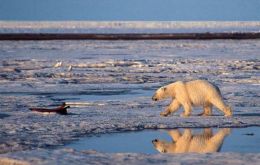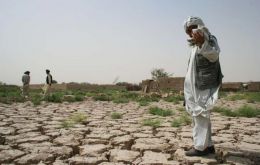MercoPress. South Atlantic News Agency
Tag: UN Intergovernmental Panel on Climate Change (IPCC)
-
Wednesday, June 7th 2023 - 09:44 UTC
Arctic Ocean may be ice-free during the summer from 2030 onwards

According to a recent study published in the journal Nature Communications, the Arctic Ocean may be ice-free during the summer from 2030 onwards regardless of the level of greenhouse gas emissions.
-
Tuesday, August 10th 2021 - 08:30 UTC
UN climate change report heralds “unprecedented” disasters

A new study released by the Intergovernmental Panel on Climate Change (IPCC) foresee the planet's temperature would reach +1.5 ºC compàred to pre-industrial levels by the year 2030, which is ten years earlier than forecast in 2018.
-
Wednesday, July 28th 2021 - 09:45 UTC
Meteorologists meet to prepare report for the UN Glasgow climate change negotiations summit

The Intergovernmental Panel on Climate Change, IPCC, opened its meeting on Monday to approve its next report on the physical science basis of climate change, the first part of the Sixth Assessment Report.
-
Thursday, September 26th 2019 - 09:57 UTC
UN apocalyptic report on global warming devastating consequences for oceans and frozen spaces

Two days after a climate summit failed to deliver game-changing pledges to slash carbon emissions, the United Nations warned on Wednesday that global warming is devastating oceans and Earth's frozen spaces in ways that directly threaten a large slice of humanity.
-
Saturday, August 10th 2019 - 07:42 UTC
UN climate change report: farming and eating habits must change to save on land and water

The way the world manages land produces and eats food has to change to curb global warming or food security, health and biodiversity will be at risk, a UN report on the effects of climate change on land said.
-
Thursday, August 8th 2019 - 22:50 UTC
World food security increasingly at risk due to 'unprecedented' climate change impact, new UN report warns

More than 500 million people today live in areas affected by erosion linked to climate change, the UN warned on Thursday, before urging all countries to commit to sustainable land use to help limit greenhouse gas emissions before it is too late.
-
Thursday, November 14th 2013 - 07:42 UTC
Manmade global warming is making 2013 the seventh warmest year since 1850

This year is the seventh warmest since records began in 1850 with a trend to weather extremes and the impact of storms such as Typhoon Haiyan in the Philippines aggravated by rising sea levels, the World Meteorological Organization (WMO) said.
